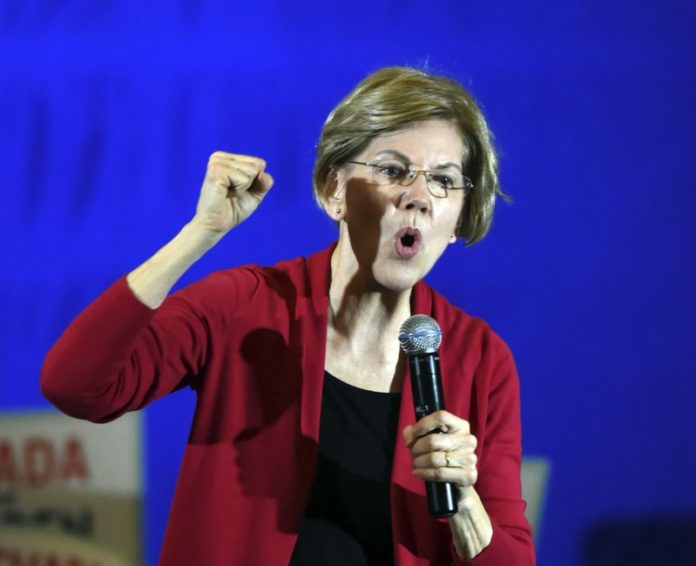
Elizabeth Warren says other Democratic presidential hopefuls are too quick to accept Republican calls for unity rather than standing up to the rich and are bending to the whims of their own wealthy donors. The sharp contrast she’s drawing is more evidence that the long simmering tensions between her party’s moderate and progressives wings are boiling over.
In what her campaign has billed as a major economic speech in New Hampshire, the Massachusetts senator says that, despite being nearly a year into the Democratic primary, “No other candidate has put out anything close to my sweeping plan to root out Washington corruption.”
“Unlike some candidates for the Democratic nomination, I’m not betting my agenda on the naive hope that if Democrats adopt Republican critiques of progressive policies or make vague calls for unity that somehow the wealthy and well-connected will stand down,” Warren plans to say on Thursday, according to excerpts released by her campaign.
The speech is the latest round in an escalating fight between Warren and her more moderate rivals, including former Vice President Joe Biden, Mayor Pete Buttigieg of South Bend, Indiana, and former New York City Mayor Michael Bloomberg. The division is growing as the first votes of the Democratic primary near and there’s mounting concern that no clear front-runner will emerge from the initial slate of contests.
Warren has centered her candidacy on proposing profound structural changes to remake the political and economic system. She wants a 2% tax on fortunes worth $50 million-plus and a levy three times that on anyone who has a net worth of more than $1 billion — and she pledges to use those to offer universal child care and free tuition at public universities while wiping out most student debt for 42 million Americans and helping to finance a “Medicare for All” plan providing government-sponsored health care nationwide.
But some potential hurdles of doing so were on display earlier Thursday, when the University of Pennsylvania’s Penn Wharton Budget Model, which provides nonpartisan analysis of public policy proposals, released findings showing that Warren’s wealth tax will raise between $2.3 trillion and $2.7 trillion over 10 years. That’s as much as $1.4 trillion less than Warren’s campaign estimates.
The analysis also concludes that the new taxes would cause the economy to contract between 0.9% and 2.1% by 2050 and says the new tax would reduce “private capital formation” enough to drive the U.S. economy’s average wage down between 0.9% and 2.3%, even affecting households not rich enough to qualify for the tax.
The findings are important because Warren’s proposal has been among the most popular — and most scrutinized —of her campaign. It’s given her an economic populist edge that helped vault her among the Democratic primary’s front-runners. The race’s other top progressive candidate, Sen. Bernie Sanders of Vermont, has proposed an even higher tax on top fortunes — but it’s such a part of Warren rallies that her crowds often break into chants of “2 cents!” in a rallying cry for her wealth tax.
The model’s analysis could provide new lines of attack for Biden and Buttigieg, who have accused Warren of basing her policy agenda on economics that don’t add up and argued that she and Sanders have demonized wealth.
Warren campaign spokeswoman Saloni Sharma said the analysis “does not account for the strong anti-evasion measures in her wealth tax and does not even attempt to analyze the specific investments Elizabeth is committed to making with the wealth tax revenue.”
“This is an analysis of a different and worse plan than Elizabeth’s, using unsupportable assumptions about how the economy works, and its conclusions are meaningless,” Sharma said.
Buttigieg, appearing on CBS on Thursday, took aim at something Warren would like to do with the wealth tax, saying, “I’m not going to promise that we can just wave away all student debt.”
The mayor said he personally understands the effects of taking on debt to pay for school but “that doesn’t mean I can just say we’re gonna make it all go away and it’s all free now.”
In her New Hampshire speech, Warren takes aim at Biden and Buttigieg, without naming either.
“We know that one Democratic candidate walked into a room of wealthy donors this year to promise that “nothing would fundamentally change” if he’s president,” she says according to the excerpts, referring to past comments by Biden.
She adds in reference to Buttigieg and his strong fundraising prowess: “We know that another calls the people who raise a quarter million dollars for him his ‘National Investors Circle,’ and he offers them regular phone calls and special access.”
“When a candidate brags about how beholden he feels to a group of wealthy investors,” Warren says, “our democracy is in serious trouble.”
___
Catch up on the 2020 election campaign with AP experts on our weekly politics podcast, “Ground Game.”
___
This story has been corrected to show the analysis said the tax would bring in at least $1 trillion less, not at least $1 billion less.
Republished with the Permission of the Associated Press.












